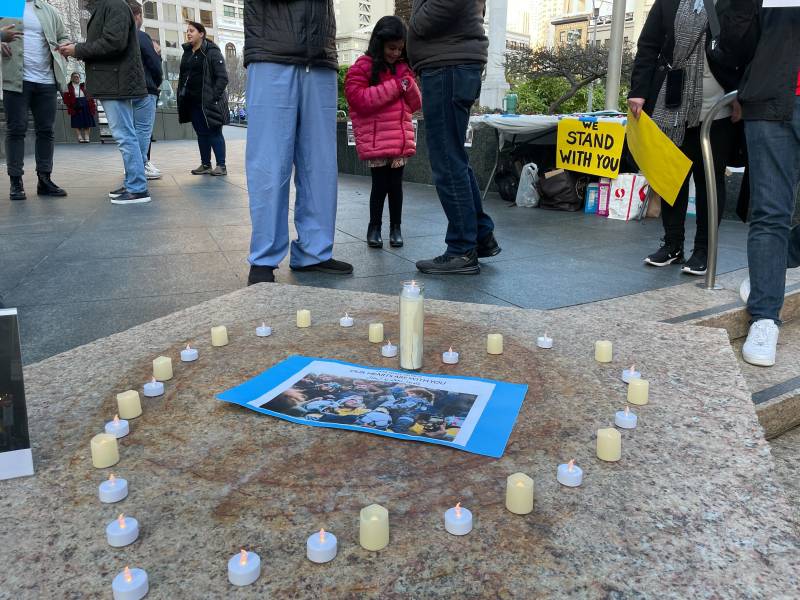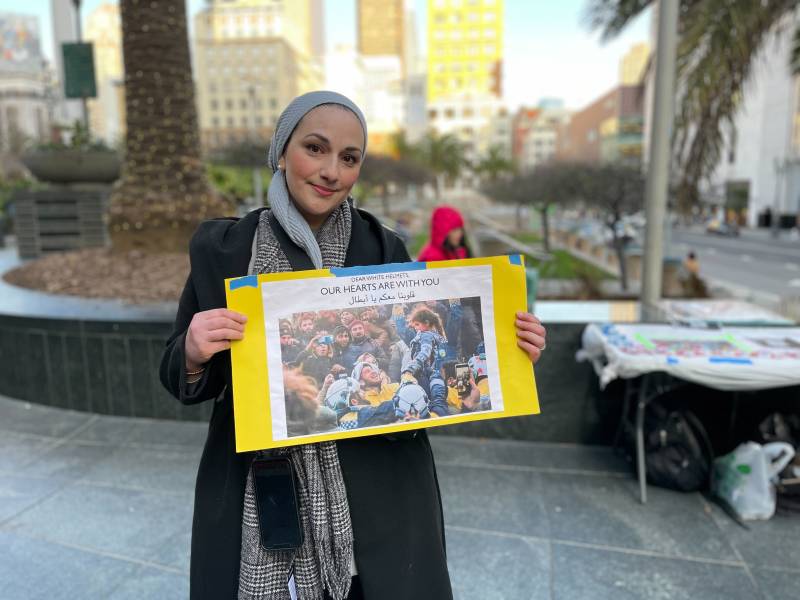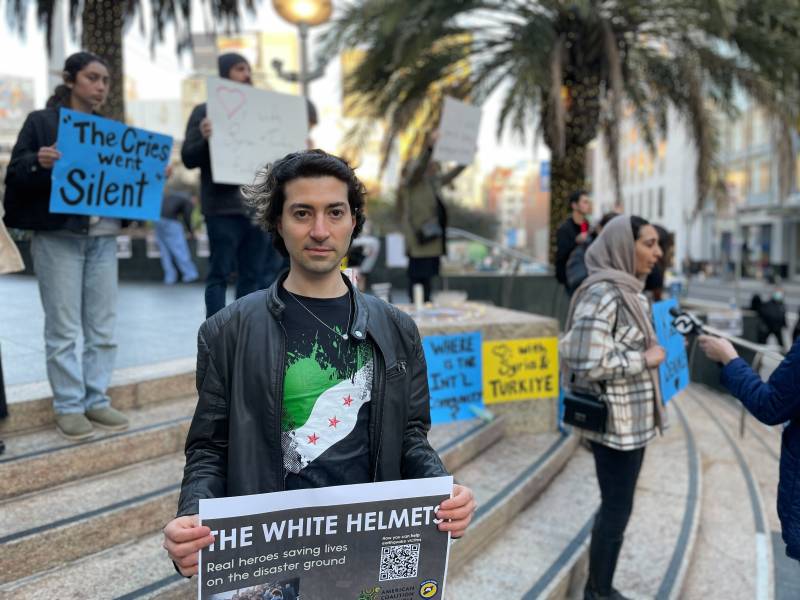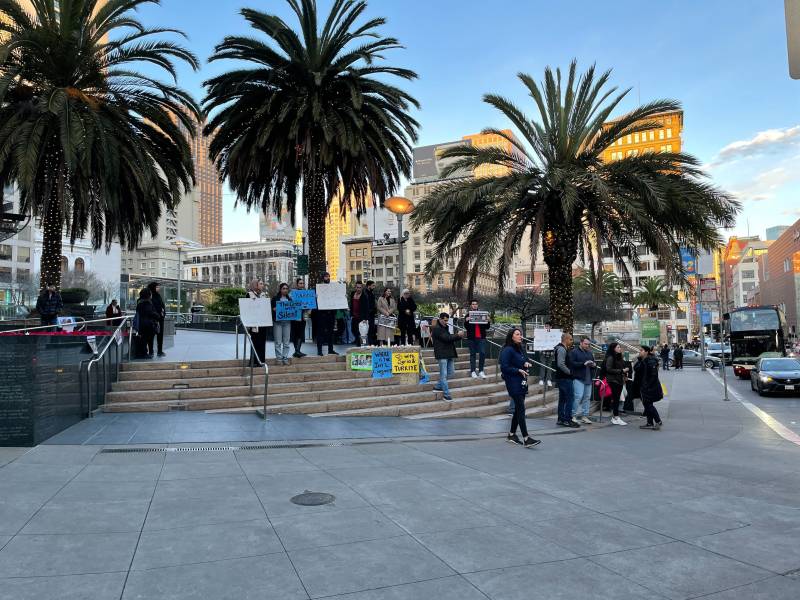Dozens of local Turks, Syrians and others across the Bay Area gathered at a vigil in San Francisco’s Union Square to mourn victims and forward relief efforts for survivors of the devastating 7.8-magnitude earthquake that hit southeastern Turkey and northwestern Syria last week. Hundreds of thousands of Turks and Syrians have been left homeless, with a rising death toll of 25,000 so far. The vigil held on Saturday afternoon was coordinated by volunteers with the American Coalition for Syria, a group of organizations that advocate for freedom, democratic reform and human rights in Syria.
Vigil Held in SF's Union Square to Honor Victims of Earthquake in Turkey and Syria

“We continue to stand in solidarity with the Turkish and Syrian people who continue to face a lot of trials and tribulations,” said Youman Horta, a 29-year-old Syrian American who lives in San Francisco. “We’re sitting here in the San Francisco Bay Area, very privileged, and the least we can do is just stand for three hours to get the word out to people. Seeing people come together, whether it’s just five or 500 … Every person counts, every dollar counts, and it helps a little bit knowing that there’s a community somewhere out there no matter how big or small.”

Maya Fallaha from Belmont was at the vigil, mourning family members who died in the earthquake in Syria.
“It’s been a mix of initially shock and numbness, and now it’s shifting to pain, immense grief and anger,” said Fallaha. “I have a cousin who lost his wife and 10-year-old son as they were attempting to escape their building that was collapsing as they were leaving. My cousin got out with his 4-month-old and two young children. But his eldest son, who’s 10, and his wife, did not make it out unfortunately. So the least I can do is be out here and honor what they’ve been through.”
“The White Helmets are our biggest heroes,” said Fallaha, referring to the famed Syrian volunteers who have put their lives on the line to help civilians through years of war in Syria, and now the earthquake. “They’re the ones on the ground rescuing people. They themselves have lost people in the collapsed buildings, and they’re working day and night without rest, trying to recover as much life as possible.”
Fallaha says the destruction from the earthquake is going to be a long-term catastrophe and she hopes that the world will rally behind and support the people who’ve already had to endure so much.
“There isn’t a person that I know in my Syrian community and Turkish community that hasn’t been impacted in one way or another,” she added. “So I’m just trying to make sense of all of this and I’m not able to.”
Devastated infrastructure, including roads and airports, is complicating and hampering relief efforts, further exacerbated by freezing winter conditions as well as food and water shortages. The situation in northern Syria is particularly dire, as humanitarian access is complicated by the civil war, while sending funds can be blocked or slowed by U.S. sanctions, despite an exemption for relief efforts. The first U.N. aid convoy didn’t enter Syria until Friday, and Syrian Americans in the Bay Area say they have been struggling to get aid to their loved ones back home.

Syrian-born Anas Abou-Ismail, a kidney doctor at biotech company CareDx, has lived in the U.S. for 12 years and says relatives and friends back home have told him the government there is not distributing aid to victims.
“They’re sending all these things and then they just leave it up to the Syrian regime to do whatever they want with the aid. So what they end up doing is they do a few photo ops with them, with some affected people, but then they take everything back,” he said.
Humanitarian groups working in southern Turkey and northwest Syria warn that Monday’s earthquake will have a “long tail” — a wide range of needs that will require donations for months, or even years, after the rescue and recovery missions end.
“They’re going through a really severe winter and right now they don’t even have enough coats or jackets,” said Horta. “Syria’s also going through a famine, and things are very expensive, and there’s been a war going on. It’s not an easy thing to think about every day.”

“I’m Syrian, so I thought that we had been really conditioned to misery over these past 12 years, but this was just really too much,” said Abou-Ismail. “The scale of the destruction, especially in northwest Syria, was just shocking. And the number of people that [died] in both countries obviously just keeps going up … So it’s been a difficult time for everyone.”
“We are still in the shock phase, we’re still trying to talk to everybody,” he added. “There are still people I haven’t been able to talk to, so we’re hoping for the best. But this is the phase we’re in right now just to make sure, like, who’s OK, who’s not.”